Mary Anne Yarde's Blog: The Coffee Pot Book Club , page 44
December 21, 2020
Join me in conversation with Historical Fiction author, David Boyle #HistoricalFiction #KindleCountdown @ davidboyle1958 @SharpeBooks

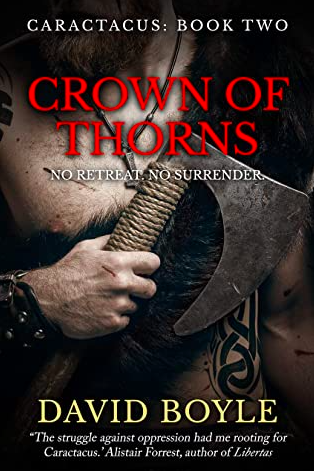
Publication Date: 19th November 2020Publisher: Sharpe BooksPage Length: 116 PagesGenre: Historical Fiction
44AD.
Caractacus, the British war leader, has been beaten into a corner and his brother, the previous high king, has changed sides in despair.
The island of Albion is split down the middle, along the line of the old Fosse Way. If Caractacus engages the Romans on the battlefield, his people will be slaughtered. If not, then he will have to accept the enemy's increasing presence in his country.
So, what should the leader of the British nations do?
To add to his trials, the soldier's old enemy returns, Scapula. The Roman officer, who murdered his sister, is out for blood. The son of the new Roman governor has the will and means to hunt Caractacus down – to end his tribe and their peaceful, civilised way of life.
As Caractacus sets up his headquarters in Caer Leon, another factor comes in to play – the early Christians and relatives of Christ himself have begun to settle in southern Siluria. Are the Romans actually there to root them out?
Heavy is the head that wears the crown.
Caractacus and those other Britons determined to reject Roman domination find themselves forced into battle - on a distant, but well-defended hillfort - in Ordovicia.
The fate of a man - and his tribe - hang in the balance.

Mary Anne: A huge congratulations on your fabulous series, Caractacus. As a skilled journalist and economist could you tell us what drew you towards writing Historical Fiction?
David Boyle: I’ve always loved history and, although I can see the world of policy looks like it is the exact opposite—I have also always regarded myself as being opposed to anything that looks too technocratic and which downgrades the human element. So perhaps it wasn’t quite the leap that it seems to be… When I wrote historical non-fiction it was often to find those stories which seemed to be at least half missing—like the friendship between Columbus and Cabot (Toward the Setting Sun) or the journey by Richard the Lionheart through Europe in disguise (Blondel’s Song). And with stories like those, you had to fill in some of the gaps. Still, I’m not sure that quite explains it does it!
Mary Anne: Caratacus, the protagonist in your series, is not someone who many people are familiar with. Could you tell us a little about who he was and why you felt inspired to tell his story?
David Boyle: Caractacus was the high king of Britain in 43 AD when the Romans invaded and all we really know for definite about him was that he was related to Cunobelinus, Shakespeare’s Cymbeline, and that he frustrated the invasion for nine years. He was then captured through the queen of the Brigantes and sent to Rome in chains—what happened next to him is in Book 3, which I haven’t written yet! In fact, all we know of him or our country at the time is via a few Roman writers who were probably biased.
I wondered whether it might be possible to go back behind those texts by Caesar and Tacitus, and work out what kind of country could have kept the Roman army at bay for nine years—a civilised nation, possibly also a Christian one, not with tribes but with nations with clear boundaries—and using some of the knowledge that radical archaeologists now believe the celts and the druids knew (like the curvature and dimensions of the earth). I wanted to write the kind of book that could maybe challenge those classicists who regard the Britons as ‘them’ and the Romans as ‘us’.
 Nor Shall My Sword Sleep by David Boyle.
Nor Shall My Sword Sleep by David Boyle.Mary Anne: What were the challenges you faced in researching this period of history and were there any unexpected surprises?
David Boyle: Well, the main problem has been just how little is known and you have to plump for rival stories, like Caractacus/Caradoc’s older brother Togidumnus. That was his Roman name; I’ve called him Togod. I’ve gone with the story that he changed sides in 43 AD and backed the Romans, and therefore identified him with Cogidumnus, who appears to have ruled a small Romanised kingdom from Fishbourne.
But the reason I wrote the book really was reading a strange book by a Canadian historian and planner, now dead, called George Jowett called The Drama of the Lost Disciples, which got me thinking about Caractacus for the first time. He argued that, according to the Vatican archives, it wasn’t just Joseph of Arimathea who came to Britain in 38AD, as legend suggests—it was the Virgin Mary and many of the surviving disciples of Jesus who took refuge in Glastonbury that year, joined later by St Peter and St Paul. Jowett’s plea was that, given that the medieval church recognised this claim by giving British bishops precedence at the great councils of the Church—we ought to take this more seriously. Or at least as seriously as the flawed and compromised memories of Roman writers with axes to grind. If this was right, Jowett suggested, then it may provide a different interpretation to the Roman invasion five years later. It may also be that Caractacus, as those archives suggest, was not a backward pagan type, but a Christian king battling the pagan Romans and desperately trying to hold back their tide of brutality. I have written Caractacus’ autobiography as if Jowett was right.
The other source of information I have used is the latest scholarship about the druids—who were not the brutal fanatics that Caesar portrayed, but were wise and civilised types who believed for example in the equality between men and women—and who made the great mistake of not writing things down (or of being on the losing side).
Mary Anne: What do you think is the most challenging aspect of writing Historical Fiction?
David Boyle: Getting the background right. It was easy for me with Caractacus because nobody has much idea what life was actually like in those days. I tried quite hard to include a sense of magical numinous authenticity, but purely because I felt that would be right, and I found a huge amount of information in John Michell’s books and others about ley-lines, for example. I like the idea that often these were also mysteries to the protagonists.
But with previous historical fiction—like with the stories about my Enigma spy heroine Xanthe Schneider in the 1940s - I really wanted to be able to evoke a little of the period if I possibly could. That also involved trying to evoke Ludwig Wittgenstein, which was a challenge in itself.
Mary Anne: What advice do you have for aspiring Historical Fiction authors?
David Boyle: Well, as an aspiring historical fiction author myself, I feel the best way is to immerse yourself in the period if you possibly can before you start to write. It is a huge privilege to be able to travel in time in this way…

Read for Free with #KindleUnlimited subscription.

 David Boyle is a thinker and a writer on a range of issues from localism to public service reform. He is co-director of the thinktank New Weather, policy director of Radix UK, an advisory council member of the Schumacher Centre for New Economics in Massachusetts, and a fellow at the New Economics Foundation.
David Boyle is a thinker and a writer on a range of issues from localism to public service reform. He is co-director of the thinktank New Weather, policy director of Radix UK, an advisory council member of the Schumacher Centre for New Economics in Massachusetts, and a fellow at the New Economics Foundation. He has been at the heart of the effort to develop co-production and introduce time banks to Britain as a critical element of public service reform. He was the government’s independent reviewer on Barriers to Public Service Choice (2012-13).
He is the author of a number of books about history, social change and the history of ideas and the future – most recently Tickbox (Little, Brown, 2020). His book Authenticity: Brands, Fakes, Spin and the Lust for Real Life (Flamingo, 2003) helped put the search for authenticity on the agenda as a social phenomenon. Funny Money: In search of alternative cash (Flamingo, 1999) launched the time banks movement in the UK. His work on the history and future of money has also been covered in books and pamphlets like Why London Needs its own Currency (2000), Virtual Currencies (2000), The Money Changers: Currency reform from Aristotle to e-cash 2002), The Little Money Book (2003) and Money Matters (2009).
He has stood for Parliament, and written a number of well-received history books, including Blondel's Song: The imprisonment and ransom of Richard the Lionheart (2005), Towards the Setting Sun: Columbus, Cabot, Vespucci and the race for America (2008), Alan Turing (2014) and Before Enigma (2015).
Historical fiction series include Theerlin Affair (2018) and other Enigma books about Xanthe Schneider and his Caractacus series which began with Nor Shall my Sword Sleep (2020).
Connect with David:

Deborah Swift is giving away a signed paperback edition of her fabulous book — THE LIFELINE #Giveaway #HistoricalFiction #Bookstagram @swiftstory


Publication Date: 5th January 2021
Publisher: Sapere Books
Page Length: 320 pages
Genre: WW2 Historical Fiction
A thread of hope in dangerous timesNazi-occupied Norway 1942
Schoolteacher Astrid Dahl has always kept out of trouble. But when she is told to teach the fascist Nazi curriculum, she refuses and starts a teacher’s rebellion, persuading eight thousand teachers to go on strike. The Germans arrest her, and terrified of what punishment her trial might bring, she is forced to go into hiding.
She sets up an illegal school and there she befriends a young Jewish girl, Sara, and her father Isaak, who is on the run from deportation. But the Nazis are determined to find her, and when they close in, Astrid decides they must make a desperate bid for freedom by leaving Norway.
Meanwhile, Astrid's boyfriend, Jørgen, has joined the Norwegian Resistance. When his cover is blown he escapes to Shetland where he is taken on as crew for the Shetland Bus; a dangerous clandestine operation of small fishing boats that supply arms and intelligence to war-torn Norway.
In Shetland, hearing Astrid is in trouble, Jørgen sets off through enemy waters to meet her. Each have only three days to make the rendezvous on the coast of Norway and must use all their courage and resources to get there.
But the Nazis have a spy on Shetland, and have been tipped off about the Shetland Bus.
With the Nazis in pursuit from both directions, will Astrid and Jørgen be able to make it in time?

If you would like to be in with a chance to win a signed paperback copy of THE LIFELINE then answer this question:
What is your favourite World War II movie?
Leave your answer in the comment section at the bottom of this post (Scroll Down)!
Good Luck!
* Open Internationally.*
Welcome to Day #8 of the blog tour for Lady Estrid: A Novel of Eleventh Century Denmark by M J Porter #HistoricalFiction #BlogTour @coloursofunison @BritonandDane

Lady Estrid: A Novel of Eleventh Century Denmark By M J Porter
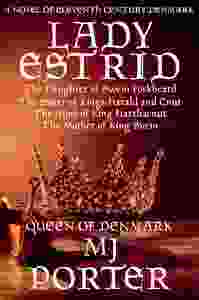

November 2nd – January 4th
Amazon UK • Amazon US
Publication Date: 29th October 2020
Publisher: Independently Published
Page Length:
Genre: Historical Fiction
Daughter, Sister, Duchess, Aunt. Queen.
United by blood and marriage. Divided by seas. Torn apart by ambition.
Lady Estrid Sweinsdottir has returned from Kiev, her first husband dead after only a few months of marriage. Her future will be decided by her father, King Swein of Denmark, or will it?
A member of the ruling House of Gorm, Estrid might not be eligible to rule, as her older two brothers, but her worth is in more than her ability to marry and provide heirs for a husband, for her loyalty is beyond question.
With a family as divided and powerful as hers, stretching from England to Norway to the land of the Svear, she must do all she can to ensure Denmark remains under the control of her father’s descendants, no matter the raging seas and boiling ambition that threatens to imperil all.
Head over to Let your words shine... and discover five fun facts you may not have known about MJ Porter!!
Click HERE!

December 20, 2020
Cathie Dunn is giving away a signed paperback edition and a digital copy of her fabulous book — Love Lost In Time #Giveaway #HistoricalFiction @cathiedunn

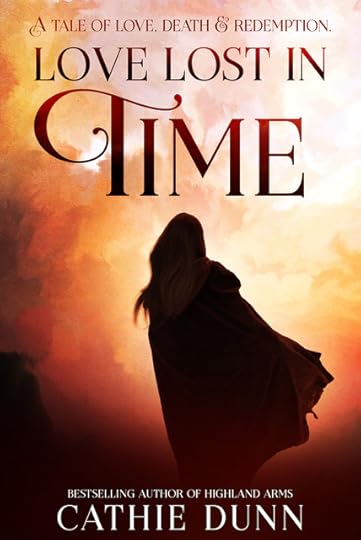
Publication Date: November 28th, 2019
Publisher: Ocelot Press
Page Length: 276 pages
Genre: Historical Dual-Timeline Mystery
A reluctant daughter. A dutiful wife. A mystery of the ages.
Languedoc, France, 2018
Historian Madeleine Winters would rather research her next project than rehash the strained relationship she had with her late mother. However, to claim her inheritance, she reluctantly agrees to stay the one year required in her late mother’s French home and begins renovations. But when she’s haunted by a female voice inside the house and tremors emanating from beneath her kitchen floorboards, she’s shocked to discover ancient human bones.
The Mediterranean coast, AD 777
Seventeen-year-old Nanthild is wise enough to know her place. Hiding her Pagan wisdom and dutifully accepting her political marriage, she’s surprised when she falls for her Christian husband, the Count of Carcassonne. But she struggles to keep her forbidden religious beliefs and her healing skills secret while her spouse goes off to fight in a terrible, bloody war.
As Maddie settles into her rustic village life, she becomes obsessed with unraveling the mysterious history buried in her new home. And when Nanthild is caught in the snare of an envious man, she’s terrified she’ll never embrace her beloved again.
Can two women torn apart by centuries help each other finally find peace?
Love Lost in Time is a vivid standalone historical fiction novel for fans of epoch-spanning enigmas. If you like dark mysteries, romantic connections, and hints of the paranormal, then you’ll adore Cathie Dunn’s tale of redemption and self-discovery.

If you would like to be in with a chance of winning a signed paperback copy or a digital copy of Cathie Dunn's fabulous book Love Lost in Time then all you need to do is pop your name on the comment section of this post (SCROLL DOWN)!
Enter HERE!
Good Luck!
* Paperback giveaway is open to European readers, including readers from the UK, only
*ebook giveaway is open Internationally
*Giveaway closes on January 4th 2021

AD 793The hills near Carcassonne, Septimania
She woke to complete darkness.
As she tried to blink, earth covered her eyes. The dull thud of pain pounded in her head. She lifted it, only to find that she could not move. Her hands were tied behind her back, and her full weight bore onto her wrists and fingers. She could not feel her legs, as if they had dislodged.
Breathing was impossible. She opened her mouth to cry out, but all that emerged was a bare whimper, a sound suppressed by earth and stones. She spat but there was nowhere for it to go. The earth turned to sticky mud as it mingled with her saliva.
In desperation, she swallowed, gagging. But with every short breath she took, more earth blocked her nose.
Then her memory returned. And with it the terror.
He had buried her alive.
‘I curse you and your offspring in perpetuity…’

Amazon

 Cathie Dunn writes historical fiction and romance. Her award-winning novels have garnered praise for authentic setting and description.
Cathie Dunn writes historical fiction and romance. Her award-winning novels have garnered praise for authentic setting and description.She is a published author, freelance editor, publisher, novel-writing tutor, and reviewer. Cathie loves historical research, often visiting castles and ruins to imagine the way people lived ‘back in the day’. She also loves delving into history books.
Resident in Scotland for many years, she now lives in Carcassonne in the south of France with her husband, a rescue dog and two cats.
Cathie would love to hear from readers:Twitter • Facebook • Instagram
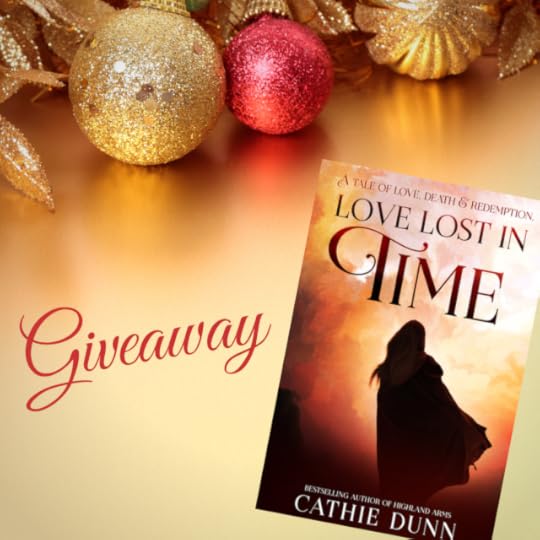
December 18, 2020
Welcome to the FINAL Day of the blog tour for By Love Divided (The Lydiard Chronicles, Book 2) by Elizabeth St.John #BookReview #histfic #BlogTour @ElizStJohn @CraftygasheadZo

By Love Divided(The Lydiard Chronicles Book 2)By Elizabeth St.John

December 7th – December 18th 2020
Amazon • Books2Read
Book Title: By Love DividedSeries: The Lydiard Chronicles, Book 2Author: Elizabeth St.JohnPublished: October 2017Publisher: Falcon HistoricalPage Length: 381Genre: Historical Fiction
London, 1630.Widowed and destitute, Lucy St.John is fighting for survival and makes a terrible choice to secure a future for her children. Worse still, her daughter Luce rejects the royal court and a wealthy arranged marriage, and falls in love with a charismatic soldier. As England tumbles toward bloody civil war, Luce’s beloved brother Allen chooses to fight for the king as a cavalier. Allen and Luce are swept up in the chaos of war as they defend their opposing causes and protect those they love.
Will war unite or divide them? And will they find love and a home to return to—if they survive the horror of civil war. In the dawn of England’s great rebellion, love is the final battleground.
A true story based on surviving memoirs, court papers, and letters of Elizabeth St.John's family, By Love Divided tells of the war-time experiences of Lucy St.John, the Lady of the Tower. This powerfully emotional novel tells of England's great divide and the heart-wrenching choices one family faces.
Head over to Zoe's Art, Craft & Life to find out what she has to say about By Love Divided:
Click HERE!
Pick up your copy for only 0.99 on #Kindle for a Limited Time!
Amazon • Books2Read

Welcome to the FINAL Day of the blog tour for The Wolf Banner (Sons of the Wolf, Book 2) By Paula Lofting #HistoricalFiction #BlogTour #CoffeePotBookClub @Paulalofting @hooverbkreview
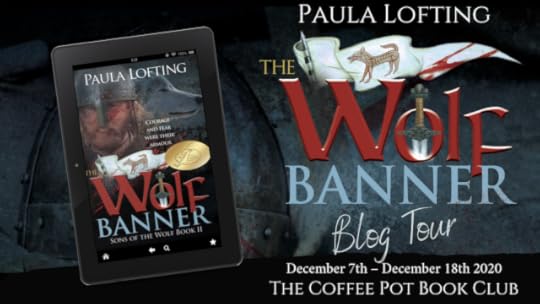
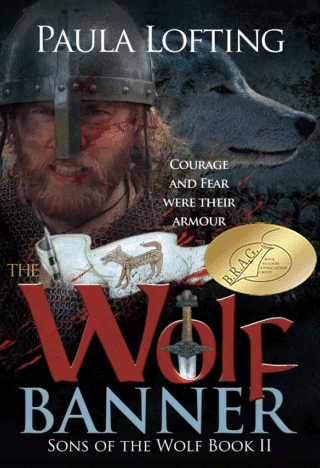
December 7th – December 18th 2020
Amazon UK • Amazon US
Publication Date: August 26th 2020 / Second Edition: Publisher: Longship PublishingGenre: Historical Fiction
WAR AND BLOODFEUD
"Best battle description ever!"
1056...England lurches towards war as the rebellious Lord Alfgar plots against the indolent King Edward. Sussex thegn, Wulfhere, must defy both his lord, Harold Godwinson, and his bitter enemy, Helghi, to protect his beloved daughter.
As the shadow of war stretches across the land, a more personal battle rages at home, and when it follows him into battle, he knows he must keep his wits about him more than ever, and COURAGE AND FEAR MUST BECOME HIS ARMOUR…
Check out what Historical Fiction Reviews has to say about The Wolf Banner:
“Duplicity, underhanded dealings, and the pragmatic approach to the politics of the day are dealt with in an informative and entertaining fashion…” Historical Fiction Reviews
To read the review in full,
Click HERE!

December 17, 2020
Find out about Aspects of History - a new website and magazine dedicated to #History and #HistoricalFiction @AspectsHistory

I am so excited to tell you about this fabulous new website and magazine that is dedicated to not only everything historical but will also showcase the very best in Historical Fiction.
It is with the greatest of pleasure to welcome the co-founder of Aspects of History, historian and archaeologist, Oliver Webb-Carter.
Mary Anne: Welcome, Oliver, to The Coffee Pot Book Club. Would you mind telling us about your fabulous new website Aspects of History, and also explain where the idea for the venture originated from?
Oliver Webb-Carter: Aspects of History is a new website and magazine dedicated to history and historical fiction. The magazine will be published bi-monthly and feature articles, interviews, short stories, and book reviews by established and new authors alike. The website will contain additional content and be updated on a regular basis. Readers can download an illustrated version of the magazine from our website. The magazine will also be available as a Kindle and print edition through Amazon. People can follow us on Twitter and sign-up to our mailing list to receive info on news, special offers and submissions. Readers can also download our first issue for a special price of £1.99/$2.99 and arrange an annual subscription for just £9.99/$9.99. Issues and subscriptions can also be gifted for Christmas presents. We are of course grateful for any and all support and welcome feedback.
One of the features of Aspects of History, as opposed to other magazines and websites, is that writers can arrange an Author Platform with us and promote themselves in an ongoing, long-term way. Authors will be able to write blog pieces each month, review books and interview other authors to help raise their sales and profile. A number of bestselling authors – including, among others, Simon Sebag Montefiore, Ben Kane and Anne O’Brien – have already arranged platforms in advance. We want to be an engine to sell books – to, like a good historical novel, educate and entertain.
Aspects of History’s genesis was partly borne from my personal interest and passion in relation to history and historical fiction. “Books are the proper study of mankind,” to quote Aldous Huxley. After working in the City for several years I wanted to return to my first love. Our advisory board and staff have a similar passion for history and working with authors.
The site and magazine are a product of my speaking to writers. Authors need platforms to showcase their books. Aspects of History will hopefully marry up authors to readers, and pool audiences. Although the site promotes established, bestselling brands – we are also mindful of giving new historians and novelists a shop window.
As well as providing a platform for published writers, I also want Aspects of History to be a hub for unpublished novelists. There are designated sections of the website devoted to students, historical societies, and creative writing groups. We want to assist authors, from pitch to publication and beyond. Should you have an unpublished historical novel in the drawer – or be interested in promoting yourself through Aspects of History – please do get in touch. Also, should you be a graduate or academic keen to distribute your dissertation or PhD, then Aspects of History could be a home to help publish and promote you too.
Mary Anne: Aspects of History really does sound wonderful. Can you tell us a bit more about your first issue?
Oliver Webb-Carter: Thankfully, through the generosity of authors and the contacts of our advisory board, we were able to arrange several coups for our first issue. Among other features, we have exclusive interviews with Ben Macintyre and Harry Sidebottom. Anthony Riches, Anne O’Brien and Saul David have also contributed articles. The latter has written a fun piece on his hero, George Macdonald Fraser. The magazine also contains short stories by EC Fremantle and Antonia Senior. There are plenty of book reviews too, for those interested in some Christmas reading recommendations.
Mary Anne: Can you explain to my readers how the submission process works?
Oliver Webb-Carter: Yes. We will be accepting submissions in January, for content for our 2021 issues. We recommend that you read the magazine and check out the website, so writers have a sense of what we are looking for. For anyone interested in submitting a short story, I would also recommend reading the HWA collections of Rubicon, Royal Blood, By the Sword and Victoriana as a guide. The magazine is a broad church in terms of covering fiction and non-fiction based around a variety of periods. Ideally, we like to help authors showcase new publications, but we can cover backlist titles too. There is understandably limited space when it comes to the magazine, but the website has additional scope to host articles, interviews, short stories and book reviews. As well as following us on Twitter, to keep abreast of news and submissions, I would recommend people sign-up to our mailing list for additional info. There is no immediate rush to get in touch. We intend to have a long shelf-life, like the books we promote.
Mary Anne: What does the future hold for Aspects of History?
Oliver Webb-Carter: Aside from sleepless nights and piles of books on my bedside table, the future is hopefully bright and expansive. Authors and publishers are getting in touch to arrange Author Platforms as word spreads. Charles Spencer, Steven Veerapen and Theodore Brun have recently joined our stable of writers. We would like to host more authors from the US over the coming year. Our long-term aims are to arrange a YouTube channel, run writing competitions, and organise book awards. We have taken the first step in a long journey and would like others to join us.
Mary Anne: Thank you so much for stopping by and chatting about your exciting new project!
If you would like to find out more about Aspects of History, then head over to their website!

#HistoricalFiction author, Steven Veerapen, is taking a look at the myths behind that infamous Scottish Play! There is also a chance to check out Steven's fabulous book — Assassination @ScrutinEye @SharpeBooks

Publication Date: 12th November, 2020
Publisher: Sharpe Books
Page Length: 311 Pages
Genre: Historical Fiction
Summer1606.
England still reels from the narrow escape of the Gunpowder Plot. Jubilation and fear compete for dominance in London as the queen’s brother, King Christian of Denmark, arrives for the first state visit seen in decades.
Ned Savage, thief and spy, is summoned by Robert Cecil and the bookish Francis Bacon.Intelligence has come in concerning the arrival of a female assassin, code-named Locusta.Savage soon discovers that the agent is in the employ of a secret society called the Brotherhood of Augustus.
Their mission is one of terror and revenge.
But who are they? And who is their target?
Savage’s search takes him into the Tower of London to interrogate the last remaining member of the Gunpowder Plotters - and an old foe, Walter Raleigh. He is also on the trail of the disgraced Penelope Devereux, sister to the late earl of Essex.
Savage gradually uncovers a plan to assassinate a king during the premiere performance of Macbeth at Hampton Court. But which king’s life is in peril - and how will the Brotherhood achieve their aim?
The spy must discover the truth behind Locusta and the Augustans and foil their assassination plot before the curtain falls.

Amazon UK • Amazon US
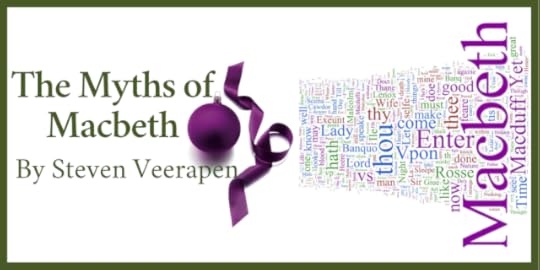
Even those who have neither read nor seen performed Shakespeare’s Macbeth undoubtedly know one thing about it: you must never say its name in a theatre, because ‘the Scottish Play’ is cursed. This alleged curse has certainly made its way into popular culture. How unforgettable the sight of the two thespians in Blackadder the Third, frantically reciting, ‘Hot potatoes, orchestra stalls, Puck will make amends!’ to exorcise the evil spirits, because ‘one does never speak the name of the Scottish play!’
Don't Mention Macbeth | Blackadder The Third | BBC Comedy Greats
But where does the idea of this curse spring from?
Supposedly, one can find all manner of dark tales emanating from the stage and behind the scenes. In the 1930s, Laurence Olivier was almost killed by falling scenery during a performance. A man in the audience then suffered a heart attack when a piece of metal flew from the stage during a sword fight. No fewer than three actors died in the course of a production during the Second World War. It all sounds very dark, very grim … and very modern.
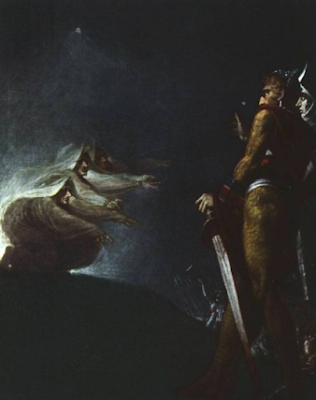 Macbeth and Banquo with the Witches by Henry Fuseli: Wikipedia
Macbeth and Banquo with the Witches by Henry Fuseli: WikipediaThe source of the alleged curse is hazy. One story goes that Shakespeare – without permission, mind you – drew on real spells when writing the Weird Sisters’ incantations into his play. This so angered the witching world that members of a real coven cursed the drama for all time. Another tale runs that King James, outraged by the depiction of his home kingdom as a place of unnatural acts and bloody deeds, forbade the play from being performed at court again – an act of royal impetuosity (for which there is no contemporary account) which so infuriated the hapless playwright that William Shakespeare cursed the play himself.
But by far the most famous – or infamous – account of the birth of Macbeth’s association with darkness pertains to its first performance at court: in the great hall at Hampton Court, in fact.
In the summer of 1606, England was visited by Queen Anne’s brother, Christian IV of Denmark. A whole festival of entertainments was laid on, from hunting at Robert Cecil’s splendid palace of Theobalds to triumphal ceremonial entries, visits to St Paul’s Cathedral and a trip around Westminster Abbey, in which effigies of England’s finest kings and queens were set up. Nor was nightly entertainment neglected. In addition to the little-known Abuses being staged at Theobalds by a children’s company, the King’s Men (of which Shakespeare was a member) were charged with staging three plays on August 7th. Amongst them was the bard’s newest drama, and one which was bound to delight a Scottish king: Macbeth.
The stage was set. The lines had been learnt. The drama adhered to all the strictures which the king had recently brought in to govern what could and couldn’t be performed publicly (cursing and oaths were out, as was the depiction of living monarchs of any nationality).
And then disaster struck.
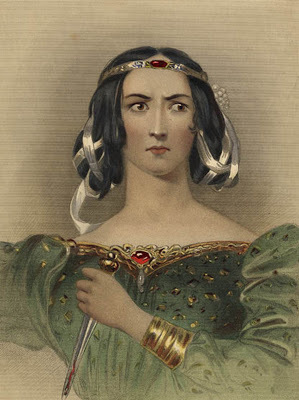 A print of Lady Macbeth from Mrs. Anna Jameson's 1832 analysis of Shakespeare's Heroines, Characteristics of Women: Wikipedia
A print of Lady Macbeth from Mrs. Anna Jameson's 1832 analysis of Shakespeare's Heroines, Characteristics of Women: WikipediaHal Berridge, the boy actor who had the plum role of Lady Macbeth fell ill of a pleurisy and dropped dead without further ado. All looked lost; the theatricals were dismayed; the king would surely be humiliated before his brother-in-law! Thankfully, however, none other than William Shakespeare himself was able to don the wig and dress and it was alright on the night. Well, except for the unfortunate Berridge, whose angry ghost apparently left behind a lasting curse.
But is the tale true?
Unfortunately, it isn’t. There never was a Hal Berridge. The entire episode sprang from the pen of essayist and humourist Max Beerbohm in 1898. This delightful piece of Victoriana, though, was of a piece with the mountain of mythology – or bardolatry – which grew in tandem with the Romantic raising up of Shakespeare to national hero status (and in part sought to fill the void of actual, concrete information about his life). Like the stories of the playwright poaching at Charlecote Park as a youth, and his being asked by Elizabeth I to write a play about Falstaff (which request saw The Merry Wives of Windsor brought to life), it is a piece of pure fiction. Yet, like the others, the story of Hal Berridge has taken on such a life of its own that it is common to find it related as fact (and not just on the internet!).
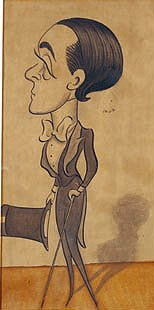 Max Beerbohm: Wikipedia
Max Beerbohm: WikipediaIn truth, although contemporary evidence tells us that three plays were indeed staged before the royal family on August 7th 1606, we do not know what they were. Macbeth, however, seems a reasonable candidate (even though the first written reference to its performance comes in 1612, scholarly opinion largely agrees on a 1606 dating). In setting Assassination during King Christian’s 1606 visit, and climaxing on the night of the three plays, I found myself unable to resist including Hal Berridge as a character (with credit, of course, given to the mischievous Beerbohm). My intention is not to misinform, but to invite readers to consider our strange and, to me, endlessly interesting relationship with Shakespearean mythology. As an avid reader of historical fiction, I’ve encountered Shakespeare as a detective; Shakespeare’s brother as a spy; Shakespeare as a spy; Shakespeare as a victim stalked by a killer… Our love of the bard appears to go far beyond the plays; it extends into a hunger for a glimpse of the man and his actions. Where we lack absolute facts, fiction, speculation, and mythology flood in, reflecting our own needs and desires as to what the man was back at us.
In Assassination, both Hal Berridge and Shakespeare appear as secondary characters – as do King James, Robert Cecil, Sir Francis Bacon, Queen Anne, and Penelope Devereux. There might, though, be a few surprises even for those who know the mythology surrounding Macbeth. Alas, I cannot promise that, as in Beerbohm’s creation of the dying boy actor myth, it’ll be alright on the night.
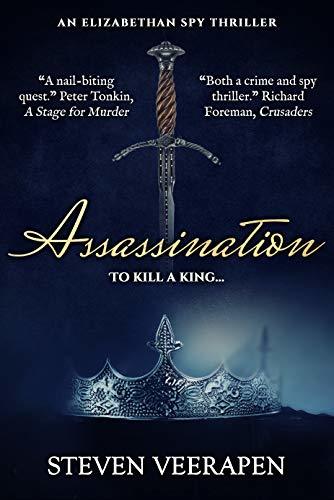

 Steven Veerapen was born in Glasgow and raised in Paisley. Pursuing an interest in the sixteenth century, he was awarded a first-class Honours degree in English, focussing his dissertation on representations of Henry VIII’s six wives. He then received a Masters in Renaissance studies, and a Ph.D. investigating Elizabethan slander. Steven is fascinated by the glamour and ghastliness of life in the 1500s, and has a penchant for myths, mysteries and murders in an age in which the law was as slippery as those who defied it.
Steven Veerapen was born in Glasgow and raised in Paisley. Pursuing an interest in the sixteenth century, he was awarded a first-class Honours degree in English, focussing his dissertation on representations of Henry VIII’s six wives. He then received a Masters in Renaissance studies, and a Ph.D. investigating Elizabethan slander. Steven is fascinated by the glamour and ghastliness of life in the 1500s, and has a penchant for myths, mysteries and murders in an age in which the law was as slippery as those who defied it.Connect with Steven:Twitter • Instagram
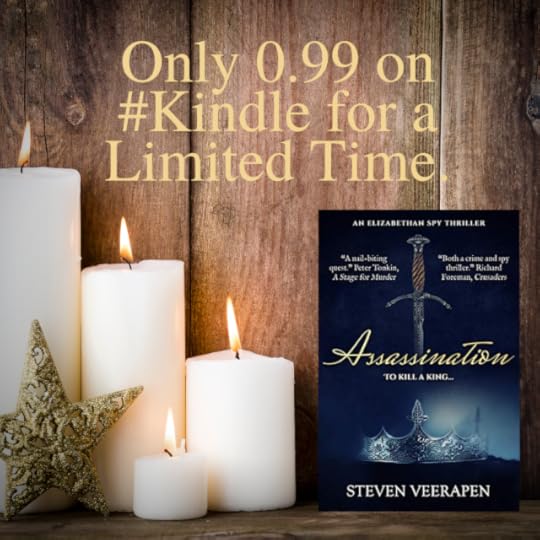
Mary Ann Bernal is giving away a signed print edition of her fabulous book — Crusader's Path #Giveaway #HistoricalRomance @BritonandDane

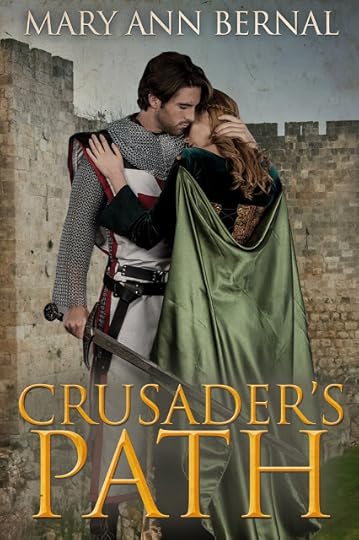
Publication Date: April 12, 2020
Publisher: Whispering Legends Press
Page Length: 222
Genre: Historical Fiction
From the sweeping hills of Argences to the port city of Cologne overlooking the River Rhine, Etienne and Avielle find themselves drawn by the need for redemption against the backdrop of the First Crusade.
Heeding the call of His Holiness, Urban II, to free the Holy Land from the infidel, Etienne follows Duke Robert of Normandy across the treacherous miles, braving sweltering heat and snow-covered mountain passes while en route to the Byzantine Empire.
Moved by Peter of Amiens’ charismatic rhetoric in the streets of the Holy Roman Empire, Avielle joins the humble army of pilgrims. Upon arrival in Mentz, the peasant Crusaders do the unthinkable, destroying the Jewish Community. Consumed with guilt, Avielle is determined to die fighting for Christ, assuring her place in Heaven.
Etienne and Avielle cross paths in Constantinople, where they commiserate over past misdeeds. A spark becomes a flame, but when Avielle contracts leprosy, Etienne makes a promise to God, offering to take the priest cowl in exchange for ridding Avielle of her affliction.
Will Etienne be true to his word if Avielle is cleansed of the contagion, or will he risk eternal damnation to be with the woman he loves?

If you would like to be in with a chance to win a signed print edition of Crusader's Path then all you need to do is answer this fun question:
If you could appear in a movie or TV show, which one would you choose?
Good Luck!
*Giveaway is open to US residents only*The winner must be willing to provide their address.*Giveaway closes on January 4th 2021

Ribbon lightning flashed across the darkened sky as Duke Robert and Etienne reached the outer castle walls. Crackling thunder shook the ground beneath them as they dismounted near the stables. The grayish clouds burst open, sending a deluge of water upon the earth. Strong winds whipped the rain, stinging the face as the men fled inside, pulling their mounts behind them. The animals neighed, standing on their hind legs, threatening to trample anyone in their way.
“All is well, hush,” Etienne said, trying to calm the horse, rubbing its face and neck with his hand.
Duke Robert managed to get his stallion into its stall and proceeded to inspect the length of the barn, comforting the animals.
“I think it best to stay here until the storm passes,” Etienne said.
Sitting on a bale of hay, Etienne leaned against the wall. Looking at the loft, he remembered a stormy night when he and Isabella took shelter on a warm summer’s day. He recalled her laughter, her wet hair sticking to her face, her eyes sparkling when he touched her cheek. Invigorated by the smell of freshly cut hay, they tumbled in the straw, satisfying their desire numerous times until the rain stopped.
You need to go home, Etienne thought.
“Has there been word of Henry?” Duke Robert said, sitting across from his favored friend. “But I have interrupted your thoughts.”
“I was just wondering how long the storm will last. As for your brother’s whereabouts, the spies have not returned. He cannot be far.”
“Have you given His Holiness’s call for an Army of God much thought? I dare say I am intrigued. My soul is in need of saving, but the peasants would revolt if I taxed them to pay for such a lengthy campaign.”
“He did say full remission of our sins,” Etienne said. “I am tempted, but my sword is yours, Your Grace.”
“Ah, that is good to hear, because, my friend, I am inclined to join the campaign. It would free me from this useless fighting. And William Rufus would probably lend me the money, or I could ask Henry. Upon our return, they would not dare to rise up against me, lest they be excommunicated.”
“If that is your wish, so be it. I would visit Argences before we leave. Isabella can rule in my absence, as she has done in the past, until we are safely home.”

Amazon UK • Amazon US

 Mary Ann Bernal attended Mercy College, Dobbs Ferry, NY, where she received a degree in Business Administration. Her literary aspirations were ultimately realized when the first book of The Briton and the Dane novels was published in 2009. In addition to writing historical fiction, Mary Ann has also authored a collection of contemporary short stories in the Scribbler Tales series and a science fiction/fantasy novel entitled Planetary Wars Rise of an Empire. Her latest endeavor is Crusader’s Path, a story of redemption set against the backdrop of the First Crusade.
Mary Ann Bernal attended Mercy College, Dobbs Ferry, NY, where she received a degree in Business Administration. Her literary aspirations were ultimately realized when the first book of The Briton and the Dane novels was published in 2009. In addition to writing historical fiction, Mary Ann has also authored a collection of contemporary short stories in the Scribbler Tales series and a science fiction/fantasy novel entitled Planetary Wars Rise of an Empire. Her latest endeavor is Crusader’s Path, a story of redemption set against the backdrop of the First Crusade.Mary Ann is a passionate supporter of the United States military, having been involved with letter-writing campaigns and other support programs since Operation Desert Storm. She has appeared on The Morning Blend television show hosted by KMTV, the CBS television affiliate in Omaha, and was interviewed by the Omaha World-Herald for her volunteer work. She has been a featured author on various reader blogs and promotional sites.
Mary Ann currently resides in Elkhorn, Nebraska.
Connect with Mary Ann:
Website • Whispering Legends Press • Let the words shine... • Facebook • Twitter • Instagram.

Welcome to Day #9 of the blog tour for By Love Divided (The Lydiard Chronicles, Book 2) by Elizabeth St.John #BookReview #histfic BlogTour @ElizStJohn @cathiedunn

By Love Divided(The Lydiard Chronicles Book 2)By Elizabeth St.John

December 7th – December 18th 2020
Amazon • Books2Read
Book Title: By Love DividedSeries: The Lydiard Chronicles, Book 2Author: Elizabeth St.JohnPublished: October 2017Publisher: Falcon HistoricalPage Length: 381Genre: Historical Fiction
London, 1630.Widowed and destitute, Lucy St.John is fighting for survival and makes a terrible choice to secure a future for her children. Worse still, her daughter Luce rejects the royal court and a wealthy arranged marriage, and falls in love with a charismatic soldier. As England tumbles toward bloody civil war, Luce’s beloved brother Allen chooses to fight for the king as a cavalier. Allen and Luce are swept up in the chaos of war as they defend their opposing causes and protect those they love.
Will war unite or divide them? And will they find love and a home to return to—if they survive the horror of civil war. In the dawn of England’s great rebellion, love is the final battleground.
A true story based on surviving memoirs, court papers, and letters of Elizabeth St.John's family, By Love Divided tells of the war-time experiences of Lucy St.John, the Lady of the Tower. This powerfully emotional novel tells of England's great divide and the heart-wrenching choices one family faces.
Check out what Ruins & Reading has to say about By Love Divided:
Click HERE!
Pick up your copy for only 0.99 on #Kindle for a Limited Time!
Amazon • Books2Read

The Coffee Pot Book Club
...more
- Mary Anne Yarde's profile
- 159 followers



